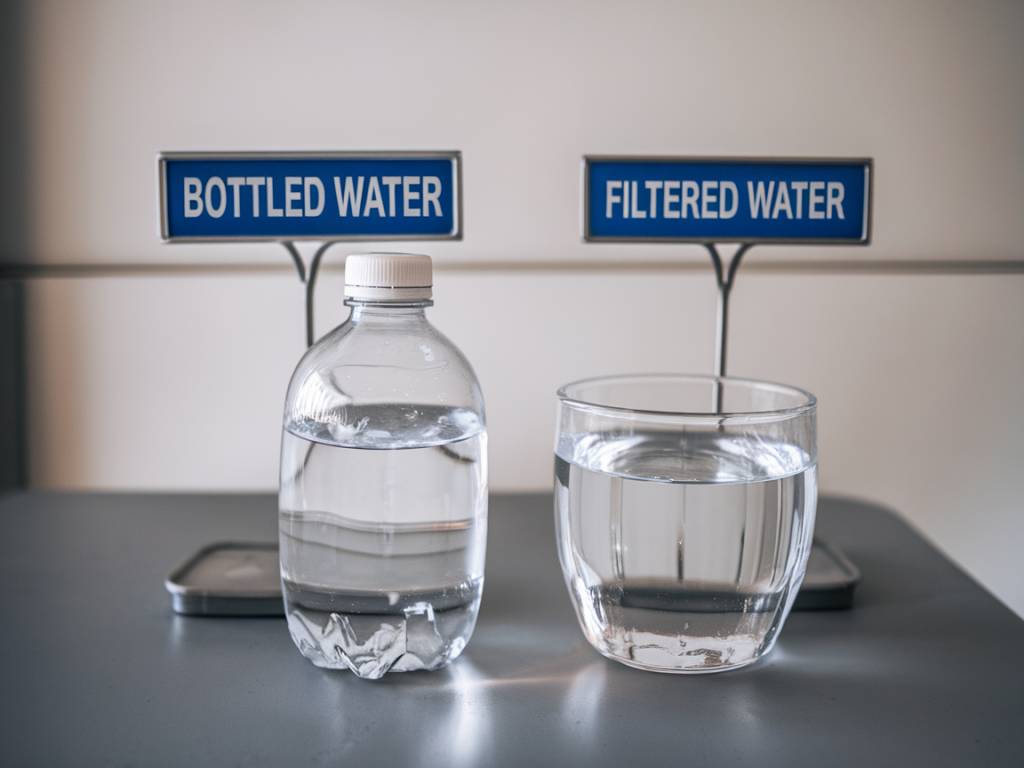« `html
Understanding Bottled Water Services
Bottled water services have long been a staple for businesses seeking convenience and reliability. With a plethora of brands offering varied options, companies can choose the perfect bottled water solution tailored to their needs. These services typically involve regular delivery of bottled water, ensuring that businesses never run out of supplies.
The primary advantage of bottled water services is the ease of access. Businesses do not need to invest in water purification systems; instead, they receive pre-packaged, ready-to-use water of guaranteed quality. However, this convenience comes at a cost, both financially and environmentally.
The Environmental Impact of Bottled Water
One significant consideration when choosing bottled water is its environmental impact. Typically packaged in plastic, bottled water contributes to plastic waste, which is a growing environmental concern globally. Even with recycling efforts, a substantial portion of these bottles end up in landfills or oceans, posing serious ecological risks.
Moreover, the production and transportation of bottled water are resource-intensive processes. They require large amounts of energy and water, leading to a higher carbon footprint compared to other options. Businesses committed to sustainability might find this aspect disconcerting and may seek more environmentally friendly alternatives.
Exploring Filtered Water Services
Filtered water services offer a sustainable alternative, providing high-quality water with reduced environmental impact. These systems often involve the installation of water filtration units within the business premises. They filter tap water, removing impurities and making it safe for consumption.
A key advantage of filtered water services is the reduction in plastic usage. By eliminating the need for bottled water, businesses contribute to waste reduction and a smaller carbon footprint. Additionally, filtered water systems often prove cost-effective over the long term, though they may require an initial investment in equipment and installation.
Cost Considerations: Bottled vs. Filtered Water
Financial implications play a crucial role in the choice between bottle and filtered water services. Bottled water services often involve recurring costs for the purchase and delivery of water, which can add up considerably over time, especially for businesses with high water consumption. On the other hand, filtered water services, while involving initial costs for installation and equipment, tend to be more economical over the long haul with significantly lower ongoing expenses.
Businesses weighing these options might consider conducting a cost-benefit analysis to determine which service aligns better with their budgetary constraints and financial goals. It’s often beneficial to calculate the break-even point for filtered systems to assess long-term savings accurately.
Quality Control and Health Benefits
The quality of water is another crucial factor influencing this decision. Bottled water is often marketed as pure or natural, and it must meet certain regulations and standards. However, there are instances where bottled water quality has been questioned due to contamination or lack of stringent testing protocols.
Filtered water, when using high-quality filtration systems, can offer equal, if not superior, safety and health benefits. These systems can be tailored to target specific impurities present in local water sources, ensuring the highest possible water quality for businesses. Regular maintenance and filter replacements are vital to maintaining the efficacy of these systems.
Convenience and Accessibility
Convenience is a pivotal factor when choosing a water service. For some businesses, the regular and reliable delivery of bottled water is a simple, hassle-free approach, ensuring no additional management or maintenance of equipment is needed. Additionally, having individual bottles makes bottled water services attractive for businesses that require portable water solutions for customers or employees.
Filtered water services, while offering sustainability and cost-efficiency, may involve some logistical considerations. These include ensuring proper system maintenance, understanding filtration requirements, and training staff to manage potential issues. For businesses with the bandwidth to handle these aspects, the long-term convenience of having an on-demand, in-house water supply can be highly advantageous.
Brand Image and Corporate Responsibility
How a business chooses to manage its water supply can significantly affect its brand image and corporate responsibility profile. Companies increasingly find that consumers and clients are attracted to businesses that take sustainability seriously. Opting for filtered water services aligns with eco-friendly initiatives, signaling commitment to reducing waste and carbon emissions.
While bottled water may seem standard, businesses can leverage transparency about their sustainable practices in water usage, potentially integrating these efforts into broader corporate responsibility strategies. This approach can enhance brand perception, customer loyalty, and even attract environmentally conscious partners or clients.
Technical Aspects and Setup
Installing filtered water systems requires understanding the technical nuances and setup requirements. It’s essential to select a system that caters specifically to the business’s needs, considering water usage volume, specific impurities present in the local water supply, and space availability for installation. Engaging a reputable provider with robust customer support is vital in this regard.
Bottled water services, conversely, require minimal technical setup. They often involve simple steps like setting up a delivery schedule, placing coolers if needed, and ensuring storage space for the bottles. Businesses concerned with minimizing operational disruptions might prefer this straightforward setup.
Final Thoughts: Bottled vs. Filtered Water Services
Deciding between bottled and filtered water services ultimately boils down to evaluating various factors such as cost, environmental impact, quality, and convenience. Both options have distinct advantages and limitations. Businesses must align their choice with their operational needs, sustainability goals, and financial capabilities.
For those prioritizing sustainability and long-term cost savings, filtered water services present a compelling case. Alternatively, companies seeking simplicity and immediate setup may gravitate towards bottled water services. By carefully assessing their priorities, businesses can make informed decisions that benefit their operations and meet their strategic objectives.
« `
